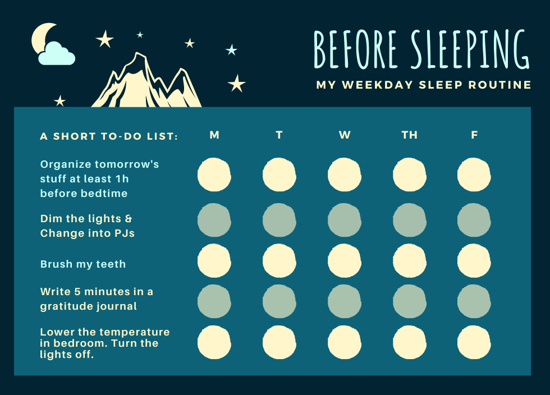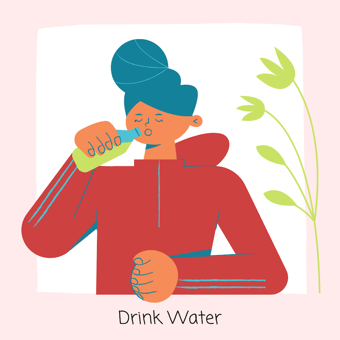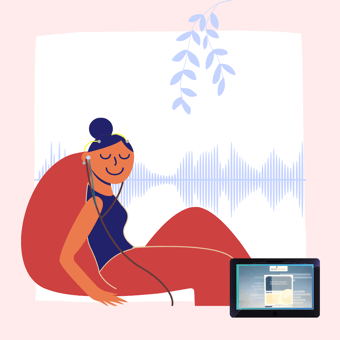Energy provides the basic fuel for many physical, emotional and cognitive processes. Whether it's about getting out of bed, taking care of a family member or generating new ideas at work, energy is required to perform at an optimal level. Where quick energy fixes like energy drinks or sugary foods can provide a temporary boost, it can leave you even more fatigued in the long-run. Continue reading to learn more about how to naturally revitalize your performance, productivity and presence.
.png?width=340&name=get-plenty-of-sleep-illustration%20(3).png) 1. Quality Sleep
1. Quality Sleep
During sleep, the body works to regulate, repair and restore many functions: the immune system, hormones, memory and learning. The ability for your body to rest impacts the levels of energy you'll have during the day. Getting quality sleep is important to operate optimally, both physically and mentally. Research shows that adults need 7 to 9 hours of sleep each night.
Here are some tips on how to get a better night’s sleep:
- Strive for a dark room: darkness helps release melatonin, a hormone that regulates the timing of sleep
- Aim for a regular sleep schedule: sleeping and waking up at the same time promotes effective sleep patterns
- Turn off screens an hour before bed including phones, TVs and computers. Screens can interfere with your body’s circadian rhythms, preventing it from winding down
- Keep it cool: the brain and body require dropping their core temperature by about 1 degree Celsius or 2-3 degrees Fahrenheit to begin and maintain sleep
- Avoid eating large meals, consuming caffeine and consuming alcohol close to bedtime
- Exercise during the day but not too close to bedtime
- Jot down restless and anxious thoughts in a journal before bed
- Take natural supplements to support sleep such as melatonin, GABA, and magnesium

2. Stay Hydrated

Up to 60% of the adult body is water. Many important functions in your body rely on water to maintain healthy energy levels. Essential functions include regulating internal body temperature, providing nutrients to cells, flushing out waste and metabolizing carbohydrates and proteins. Drinking water is especially important in high temperature environments or when exercising. A study looking at the importance of hydration during exercise showed that men who walked on a treadmill and lost >1% of their body mass in fluid reported more fatigue and negative changes in vigilance and working memory than those who remained hydrated.
A healthy goal is half of your body weight in ounces per day of water. If you weigh 140 lbs you should drink approximately 70 ounces of water, that would be 5 tall 16 oz glasses.
 3. Eat Nutritious, High-Energy Snacks
3. Eat Nutritious, High-Energy Snacks
It’s easy to go for sugary, high-fat foods for a quick energy boost but they often come at a cost, leading to more fatigue down the line. Choosing snacks that provide sustained energy can provide you with a reliable boost in energy. Nutritious, high-energy snacks are protein-rich, contain good fats and are high in fiber. These can look like carrots and celery sticks with hummus, or a handful of nuts like almonds and walnuts. Or, they can look like dried fruits like raisins, figs, berries, Greek yogurt or hard-boiled eggs. These snacks prevent sugar spikes and leave you with sustained energy throughout the day.
Also Read:
 4. Exercise
4. Exercise
Regular exercise (recommended 30 minutes a day) serves as a powerful source of energy. Exercise increases oxygen flow and circulation throughout the body, strengthening the cardiovascular system and cognitive functioning. Several neurotransmitters are released in your brain during physical activity such as dopamine, norepinephrine, and serotonin that serve to enhance energy and mood. Even a small dose of exercise can be invigorating. In a small study, researchers discovered that climbing the stairs for just 10 minutes was enough to boost energy levels beyond a moderate dose of caffeine (50mg).
 5. Meditate
5. Meditate
Meditation helps to reawaken your body and mind by paying attention to the present moment. Meditating increases awareness between your thoughts, emotions and actions and creates a connection between your internal and external world. As a result, it can help you to improve decision-making, deactivate stress and promote emotional well-being. For example, a study found that meditating regularly reduces the chances of developing depression and other mood-related disorders. Meditation can also induce flow states which are known to improve performance, motivation and emotional regulation, all of which provide powerful boosts in energy.
6. Neurofeedback

Neurofeedback devices are at the forefront of brain training technology. While not all neurofeedback devices are created equally, with the higher quality systems, the precisely timed feedback communicates to the brain so it can recognize ineffective, stuck patterns and move towards healthier ones. Stuck patterns can look like ineffective concentration, feeling stressed, poor sleep, and worrying.
Neurofeedback is a great brain training tool as its goal is to optimize overall mental and emotional performance, leading to greater energy levels. As a non-invasive and fully automated device, neurofeedback can be done in the comfort of your own home and is safe for all ages. Adding neurofeedback to your routine is a great way to tap into your natural energy reserves.
Whatever tools you employ to boost your energy, remember consistency is key and giving yourself enough time with the new tool to see results. Typically, it takes three months to change a habit and see results. Keep going and keep reading!